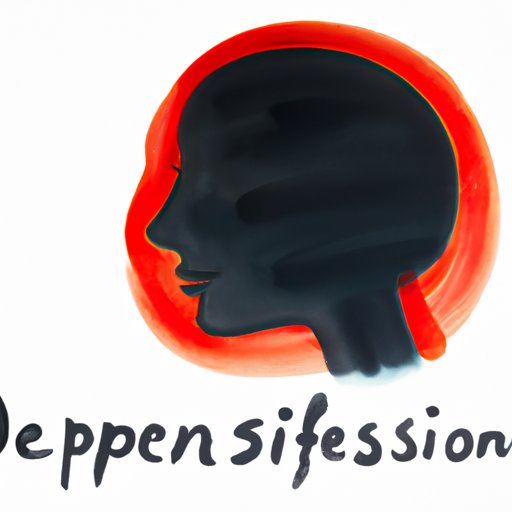
I. Introduction
Depression is a common mental health issue that affects millions of people worldwide. While many people associate depression with weight gain, it’s also possible for depression to cause weight loss, which can be concerning for those experiencing this symptom. It’s important to understand the relationship between depression and weight loss so that individuals can seek appropriate treatment and support for their mental and physical wellness. In this article, we’ll explore the link between depression and weight loss, the science behind how depression affects appetite and metabolism, and tips for managing depression-induced weight loss.
II. The Link Between Depression and Weight Loss: Understanding the Relationship
Depression is a mood disorder that can impact all aspects of life, including physical health. Depression can cause a decrease in appetite and interest in food, leading to unintentional weight loss. According to a study published in the American Journal of Psychiatry, depression is associated with a higher risk of unintentional weight loss in older adults. However, depression-induced weight loss can occur at any age, and is often overlooked or misunderstood.
III. When Coping with Depression Leads to Unintentional Weight Loss
There are several behaviors or habits that can contribute to weight loss in individuals with depression. These may include a lack of interest in food or cooking, decreased pleasure in eating, or changes in sleep patterns that disrupt normal meal times. In addition, depression can lead to social withdrawal and a lack of physical activity, which can further contribute to weight loss. It’s important to note that weight loss in individuals with depression is often unintentional and can be a sign of a deeper problem.
IV. The Science Behind How Depression Affects Your Appetite and Metabolism
Research has shown that depression can impact the two primary factors that regulate appetite and weight: metabolism and hormones. Depression can lower metabolic rates, which means that the body burns fewer calories even during physical activity. Depression can also influence hormones such as serotonin and dopamine, which normally regulate mood, appetite, and digestion. When these hormones are imbalanced, it can lead to changes in appetite, sleep, and activity levels that contribute to weight loss.
V. When Sadness Changes Your Eating Habits: The Connection Between Depression and Weight Loss
It’s not uncommon for changes in eating habits to be a sign of depression. Some individuals with depression may eat less or skip meals due to a lack of interest in food or difficulty with meal planning. Others may overeat in response to emotions like stress or sadness, which can lead to weight gain. In addition, medications used to treat depression can affect appetite and weight. All of these factors can impact what and how much someone with depression eats, leading to significant changes in weight.
VI. Understanding the Connection Between Depression, Stress, and Weight Loss
Stress is a common trigger for depression and can also impact weight. When the body is under stress, the cortisol hormone is released, which can impact metabolism and lead to weight gain or loss. In individuals with depression, chronic stress can make it even more challenging to manage weight and maintain a healthy lifestyle. It’s important to address both depression and stress in order to manage weight more effectively.
VII. The Surprising Impact of Depression on Your Body: How It Can Affect More Than Just Your Mood
Depression can impact more than just mood and weight. It can also impact physical health, contributing to issues like digestive problems, heart disease, and chronic pain. When depression is left untreated, it can have lasting consequences on overall health and wellbeing. It’s important to prioritize mental health and seek appropriate treatment to avoid these potential long-term health consequences.
VIII. How to Manage Depression-Induced Weight Loss: Tips for Finding a Healthy Balance
If you’re experiencing depression-induced weight loss, there are several steps you can take to manage your symptoms. First, seek treatment for depression from a qualified healthcare professional. This may include psychotherapy, medication, or other treatments. Second, focus on self-care by engaging in activities that promote mental and physical wellness, such as exercise, relaxation techniques, and social support. Finally, consult with a healthcare professional about healthy weight management strategies, such as consuming nutrient-dense foods and engaging in regular physical activity.
IX. Conclusion
Depression can impact all aspects of life, including weight. By understanding the link between depression and weight loss, individuals can seek appropriate treatment and support for their mental and physical wellness. With practical tips for managing depression-induced weight loss, readers can take steps towards promoting their overall health and wellbeing. Remember, prioritizing mental health is an important step towards achieving physical wellness.





